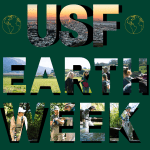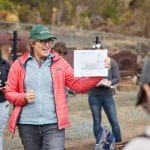On April 4th, the Department of Environmental Science at USF held our 12th Annual José de Acosta Lecture on the Environment. This year’s featured speaker was Dr. Ilkay Altintas, the Chief Data Science Officer of the San Diego Supercomputer Center at UC San Diego. Her talk, “Harnessing Big Data and the Digital Continuum for Next-Generation Wildland Fire Science and Management”, presented a novel approach for using composable systems at the intersection of scientific computing, artificial intelligence (AI), physics-driven simulations, and remote sensing at the edge, including the first working example of a composable infrastructure for fire science.
Prior to the event, we interviewed Dr. David Saah,USF Professor and Director of the Geospatial Analysis Lab (GsAL), to discuss his involvement in the development of technological programs that assist California in assessing wildfire patterns and prediction models. Dr. Saah has collaborated with Dr. Altintas and many other professionals in the development of the Climate and Wildfire Institute (climateandwildfire.org), which focuses on delivering climate and wildfire-related research services to decision makers. Dr. Saah utilizes his expertise in wildfire management and GIS, while Dr. Altintas utilizes her expertise in computer science, to develop wildfire prediction and management toolkits to aid the state with wildlife treatment.
Under the leadership of Dr. Saah and other GsAL faculty, in USF students in GsAL courses are able to utilize real-world data and analyze timely environmental
management issues in a collaborative way – just as Dr. Saah Dr. Altintas use computer science and GIS technology to model wildfire patterns and vegetation management strategies.
As geospatial environmental data has expanded via satellite, remote sensing, and a re-visiting of traditional ecological knowledge, environmental scientists and managers need to utilize more advanced computing techniques and collaborate with others to better manage our ecological resources. As Dr. Saah emphasizes, “It’s no longer enough to be a field ecologist, you have to be a field ecologist that understands [data] technology”.
We’d like to thank USF Alumna and Board of Trustees member, Michelle Skaff and her
husband Dan, for the generous support of the José de Acosta Lecture. The 2023 lecture
was supported by: USF Environmental Science (ENVS), MS in Environmental
Management (MSEM), Geospatial Analysis Lab (GsAL), Data Science, and Computer
Science.





